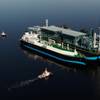INTERTANKO gives its wholehearted support to the initiative of the IMO Secretary-General, Bill O'Neil and the European Commission Vice President Loyola de Palacio to discuss possible new measures needed to prevent accidents such as the Prestige from occurring again.
INTERTANKO fully supports the IMO and actively participates in developing and promoting measures aimed at improving safety at sea which will be the focus for the discussion at the Brussels meeting today.
In the particular case of the Prestige, INTERTANKO stresses the need for comprehensive post-incident investigation and a dispassionate and rational approach to the development of any new regulation.
INTERTANKO strongly believes that any new measures to regulate and control oil transportation must be subject to thorough and rigorous analyses and impact studies by IMO before introduction, and that all the regulations must be international. Unilateral and regional measures undermine the importance of the IMO as the correct forum for decisions on maritime safety and the development of a coherent international regulatory regime.
Peter Swift, Managing Director, said "We remain hopeful that the European authorities will see the merit in progressing their proposals through the IMO, with the opportunity of involving fully the international maritime community. This would also ensure a rigorous analysis and assessment of the benefits and costs of the various proposals as well as the implications for all involved. We therefore applaud this initiative and hope that it will be successful. It is of course ironic that at the same time as the European Commission is asking for a "governmental" seat at the IMO, on behalf of the European Community, it has elected thus far to develop these proposed measures on a unilateral basis outside of the IMO forum and without international consultation."
INTERTANKO will, however, continue to work closely with the European Commission but notes with concern that other Administrations outside of Europe, for differing reasons, are now considering their own measures as a reaction to the EU's regional initiatives. While similar in scope these are not guaranteed to be identical and have the potential, - in addition to creating confusion, instability, and lack of uniform implementation, - to severely restrict tanker availability and disrupt oil supplies.
Subscribe for
Maritime Reporter E-News
Maritime Reporter E-News is the maritime industry's largest circulation and most authoritative ENews Service, delivered to your Email five times per week












